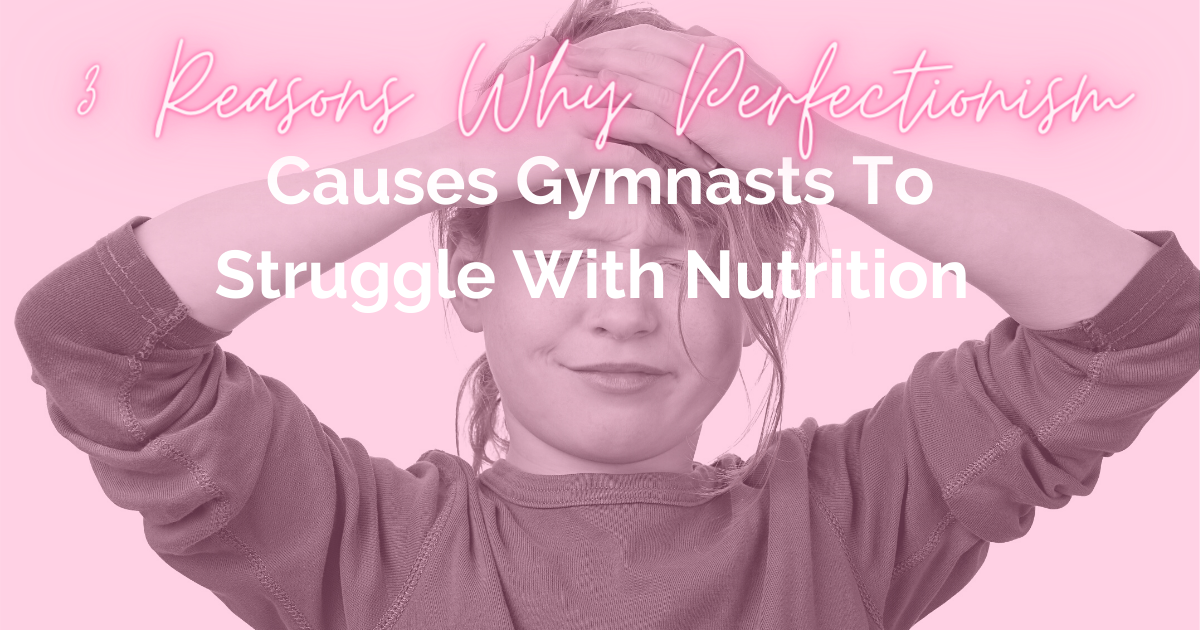
3 Reasons Why Perfectionism Causes Gymnasts to Struggle with Nutrition
explore the blog
free training
The Podcast
Learn to fuel the gymnast for optimal performance and longevity in the sport.
How to Fuel the Gymnast
Learn how to fuel your gymnast so that you can avoid the top 3 major nutrition mistakes that keep most gymnasts stuck, struggling, and injured.
looking for...?
Gymnastics is a sport of perfection. Gymnast’s scores start from a 10.0 and go down from there. The artistry, competition, and pursuit of perfection often attract a certain personality type, one we typically consider “Type A”.
While there some advantages to “Type A” personalities and gymnastics certainly teaches amazing life skills, work ethic, discipline, etc…this iron-clad approach does not mesh well with nutrition or body image.
There are several thought patterns and behaviors relating to nutrition and body image that stem from perfectionism, including “all or nothing” thinking, unsustainable nutrition practices, and weight/shape concerns. These behaviors often lead to under fueling, self-sabotage, and often disordered eating and body dysmorphia.
All or Nothing Thinking
Dichotomous or “all or nothing” thinking is very common for the gymnast. Gymnasts (and others who struggle with perfectionism) often think that there are “good vs bad” foods, “good days vs bad days” with nutrition, and this can also translate into performance as well. I’ve worked with gymnasts who will refuse to take another turn on bars or vault if they feel like their first attempt “wasn’t good enough”.
Unfortunately, this kind of thinking can often lead to self-sabotage when it comes to food. First, the gymnasts tries to eat “perfectly”, for many is considered “clean eating” or following some sort of prescriptive plan to a “T”. They may be successful for a while, but at some point, they deviate.
When life happens or the gymnasts gets tired of the rigid, restrictive diet and they eat something they consider “bad”, it’s common for them to continue eating out of guilt and “I’ve already blown it, so doesn’t matter now”. This is not helpful nor productive for health, body composition, or performance and often leads to a period of dietary restriction or over-exercising to try and “compensate”.
Unsustainable Approaches to Nutrition
Some gymnasts are seemingly able to follow a strict plan for years and years, but such a plan may leave them underfueled. Gymnasts often need a lot more nutrition (calories) than they think, and trying to eat only fruits, vegetables, lean proteins, and fibrous starches may be insufficient from a caloric perspective. For a gymnast who needs 3000+ calories a day, if they try to only eat lean protein, fibrous starches, and fruits/vegetables, they will likely be too full before they get in everything they need for the day.
We know that rigid control of eating behaviors in men and women is associated with more eating disorder symptoms and greater mood disturbances than was flexible control of eating behaviors.
A monotonous diet (such as one with little variety due to elimination of “forbidden” foods) triggers food cravings.
The Pursuit of the Perfect Gymnast Body
Lastly, perfectionism can also lead to major weight and shape concerns in gymnasts. There has long been this “perfect gymnast body” ideal that characterizes a slim, svelte, long “lean” gymnast body that is light and moves effortlessly through the air.
This major issue with this “thin ideal” is that it does not recognize body diversity nor the reality that today’s gymnastics difficulty requires such strength and power that most gymnasts will have a significant amount of muscle mass to perform the skills.
Weight and shape concerns in the gymnast can also lead to obsession with the scale, and any gymnast who has struggled with their weight will tell you that the number is never “low enough”. This is related to the perfectionism, but can be deadly.
A more moderate approach to nutrition and sport
I used to suggest following an “80/20” approach to nutrition…80% of the time one should eat “healthy foods” like nothing fried, fruits/veggies, lean proteins, healthy fats, etc and 20% of the time could be “junk foods”, etc.
I no longer use that phrase as it is still diet-like.
I like to ask my gymnasts what balance with foods feels like to THEM? What can they ADD to their diet to improve performance versus remove? How can they consistently nourish their bodies while enjoying all foods with guilt, shame, and anxiety?
If you have any more questions, feel free to schedule a free 20 minute discovery with me!
on the blog